|
|
|
Sort Order |
|
|
|
Items / Page
|
|
|
|
|
|
|
| Srl | Item |
| 1 |
ID:
115087
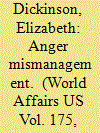

|
|
|
|
|
| Publication |
2012.
|
| Summary/Abstract |
Fourteen months ago, Ali was one of Bahrain's young, educated up-and-comers. The twenty-seven-year-old, with matted black hair and eyes that look too big for his skinny frame, worked as a chemist at the state oil company. Fluent in English and tech-savvy, he was happily married and his wife was pregnant. He was starting a promising life.
|
|
|
|
|
|
|
|
|
|
|
|
|
|
|
|
| 2 |
ID:
115084
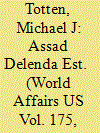

|
|
|
|
|
| Publication |
2012.
|
| Summary/Abstract |
Syria's tyrant Bashar al-Assad is in the middle of a life-or-death struggle. He might be overthrown. He should be.
The Arab Socialist Baath Party regime, beginning with its founder Hafez al-Assad and continuing through the rule of his son Bashar, is the deadliest state sponsor of terrorism in the Arab Middle East. It assisted the bloodthirsty insurgency in Iraq that killed American soldiers by the thousands and murdered Iraqi civilians by the tens of thousands. It has used both terrorism and conventional military power to place Lebanon under its boot since the mid-1970s. It made Syria into the logistics hub for Hezbollah, the best-equipped and most lethal non-state armed force in the world. It has waged a terrorist war against Israel and the peace process for decades, not only from Lebanon, but also from the West Bank and Gaza. And it is Iran's sole Arab ally and its bridge to the Mediterranean.
|
|
|
|
|
|
|
|
|
|
|
|
|
|
|
|
| 3 |
ID:
115088
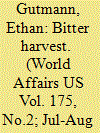

|
|
|
|
|
| Publication |
2012.
|
| Summary/Abstract |
When Wang Lijun made his break for the US consulate in Chengdu on the night of February 6th, he was in a unique position to reveal a series of damaging stories about his superior, Bo Xilai: Bo's familial connection to the suspected murder of British businessman Neil Heywood, siphoning of Chongqing's public funds, and shakedowns of local criminal and triad elements. As former head of the Chongqing Public Security Bureau, Wang also knew that Bo, as Chongqing party secretary, had engaged in surveillance of Politburo members, potentially implying that Bo and other players aligned with Jiang Zemin's faction-most prominently, Zhou Yongkang, secretary of the powerful Political and Legislative Affairs Committee (PLAC)-were thinking about seizing power. Faced with the complexity of China's leadership transition crisis, most Western editors played up the Sopranos aspect of the sordid tale, fixing on the alleged Heywood murder, essentially the same interpretation being relentlessly pushed by the Chinese Communist Party-controlled media, and allowed an even more sinister story to slip by virtually unnoticed. On March 23rd, China's vice minister of health, Huang Jiefu, publicly declared the country's intention to end "organ donations" from executed prisoners. Yet the euphemism didn't conceal the reality, for on the night of February 6th, Wang was in a unique position to reveal one more story-specifically, how the party has been harvesting the organs of their political enemies for years.
|
|
|
|
|
|
|
|
|
|
|
|
|
|
|
|
| 4 |
ID:
115091
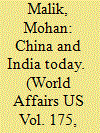

|
|
|
|
|
| Publication |
2012.
|
| Summary/Abstract |
Just as the Indian subcontinental plate has a tendency to constantly rub and push against the Eurasian tectonic plate, causing friction and volatility in the entire Himalayan mountain range, India's bilateral relationship with China is also a subtle, unseen, but ongoing and deeply felt collision, the affects of which have left a convoluted lineage. Tensions between the two powers have come to influence everything from their military and security decisionmaking to their economic and diplomatic maneuvering, with implications for wary neighbors and faraway allies alike. The relationship is complicated by layers of rivalry, mistrust, and occasional cooperation, not to mention actual geographical disputes.
|
|
|
|
|
|
|
|
|
|
|
|
|
|
|
|
| 5 |
ID:
115092
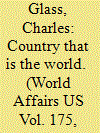

|
|
|
|
|
| Publication |
2012.
|
| Summary/Abstract |
The mufti recounted with fondness a drive he made with his wife from Montreal via Toronto to New York in 1994. Somewhere past Niagara Falls, the couple stopped at a McDonald's. All the seats were taken. "I was dressed like this," the mufti said, pulling at the lapel of his robes, "and my wife was in hijab." An American man, aged about sixty-five, got up and offered them his table. When the mufti declined, the man insisted, "I'm an American, and I can go home and eat. You are my guest."
|
|
|
|
|
|
|
|
|
|
|
|
|
|
|
|
| 6 |
ID:
115090
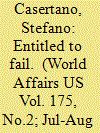

|
|
|
|
|
| Publication |
2012.
|
| Summary/Abstract |
October 15, 2011, was the day when recent Italian history changed course. After twenty years of Berlusconian torpor, Italians staged a large demonstration in Rome to voice their woes. It was not so much the "bunga bunga" sex scandals as the tangible perception of financial distress that drove citizens into the streets. Of course, there had been similar events previously in the Eternal City, most notably a recurring "No Berlusconi Day," but none had had such broad participation. There were families, youngsters, pensioners, blue and white collars, union representatives and entrepreneurs, all chanting and yelling. There were also some who wore black helmets and marched in columns, and some parading with a different uniform of hood and a scarf covering the face. It was just a minority, yet it was motivated enough to turn the half-million-people march into a long afternoon of urban warfare. A Carabinieri (military police) van burst to flames, as paving stones rained on police units. Seventy people had to be treated in the hospital. Television viewers were shocked at the Felliniesque image of a boy carrying a woman in his arms, then throwing her to the ground and kicking her head. It was a statue of the Holy Mary, stolen from a nearby church, and it broke into pieces under his assault.
|
|
|
|
|
|
|
|
|
|
|
|
|
|
|
|
| 7 |
ID:
115085
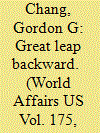

|
|
|
|
|
| Publication |
2012.
|
| Summary/Abstract |
As April passed into May this year, one electrifying story replaced another in the consciousness of the Chinese public. The first involved a ruthless official struggling for control of the ruling Communist Party and the second a solitary activist who, without this being his stated intention, challenged the one-party state from below. Soon, the two narratives began to merge, posing a threat of the first order to China's increasingly fragile political system.
|
|
|
|
|
|
|
|
|
|
|
|
|
|
|
|
| 8 |
ID:
115086
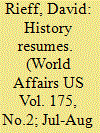

|
|
|
|
|
| Publication |
2012.
|
| Summary/Abstract |
The influence of sectarianism in politics is about as welcome a topic among policymakers as the drunken uncle or the drug addict son is at the family dinner table. Indeed, a strong case can be made that it is because policymakers in powerful countries, above all in the United States and Western Europe, within the UN system, especially in the departments of political affairs and peacekeeping, and at the World Bank and the IMF, tend to craft their strategies and make their decisions as if sectarianism were a minor concern rather than the central one that it has always been in most parts of the world, that, like a sort of Philosopher's Stone in reverse, it has turned so many supposed geostrategic sure things into either disappointments or outright failures.
|
|
|
|
|
|
|
|
|
|
|
|
|
|
|
|
| 9 |
ID:
115083
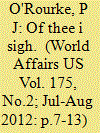

|
|
|
|
|
| Publication |
2012.
|
| Summary/Abstract |
When did America quit bragging? When did we stop punching hardest, kicking highest, roaring loudest, beating the devil, and leaving everybody else in the dust?
We're the richest country on earth-four and a half percent of the world's people producing more than twenty percent of the world's wealth. But you wouldn't know from the cheapjack spending squabbles in Congress. We possess more military power than the rest of the planet combined. Though you couldn't tell by the way we're treated by everyone from the impotent Kremlin to the raggedy councils of the Taliban. The earth is ours. We have the might and means to achieve the spectacular-and no intention of doing so.
|
|
|
|
|
|
|
|
|
|
|
|
|
|
|
|
| 10 |
ID:
115089


|
|
|
|
|
| Publication |
2012.
|
| Summary/Abstract |
Like other Arab dictators over the past year or so, Omar Hassan al-Bashir, who has ruled Sudan since 1989, is facing what's liable to be his last days in office. His end might resemble Muammar el-Qaddafi's, with a mob of angry militants cornering him in a ditch or side street, delirious at the opportunity to exercise some small measure of revenge. Or it might look like Hosni Mubarak's, with a brief message sheepishly read on state television while an opaque yet orderly reshuffling of power occurs far from the prying eyes of opposition forces or street-level activists. Or perhaps his ouster will be like Ali Abdullah Saleh's in Yemen, with the despised autocrat staggering impotently toward a graceful exit and eventually leaving the remnants of his political machine to shore up a country on the brink of collapse.
|
|
|
|
|
|
|
|
|
|
|
|
|
|
|
|
|
|
|
|
|